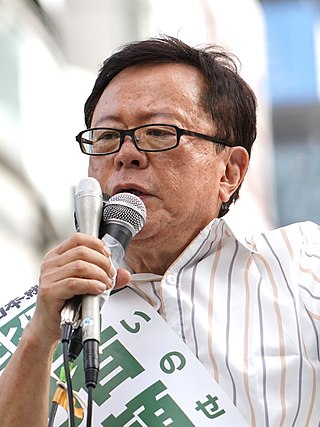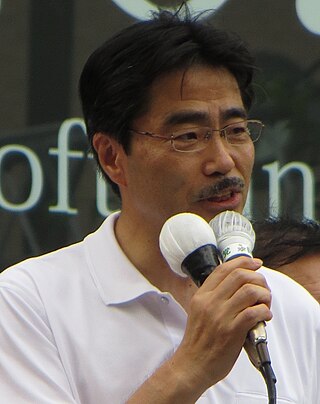| |||||||||||||||||||||||||
| Turnout | 5,942,443 (62.6%) | ||||||||||||||||||||||||
|---|---|---|---|---|---|---|---|---|---|---|---|---|---|---|---|---|---|---|---|---|---|---|---|---|---|
| |||||||||||||||||||||||||
| |||||||||||||||||||||||||
The 2012 Tokyo gubernatorial election took place on December 16, 2012, which was held on the same day as the general election.
| |||||||||||||||||||||||||
| Turnout | 5,942,443 (62.6%) | ||||||||||||||||||||||||
|---|---|---|---|---|---|---|---|---|---|---|---|---|---|---|---|---|---|---|---|---|---|---|---|---|---|
| |||||||||||||||||||||||||
| |||||||||||||||||||||||||
The 2012 Tokyo gubernatorial election took place on December 16, 2012, which was held on the same day as the general election.
After long-term Governor Shintaro Ishihara suddenly resigned to return to national politics ahead of the then-looming next general election. [1] A field of nine candidates emerged, with the front-runner being Naoki Inose, who had been vice-governor under Ishihara from 2007 to 2012, and then acting governor after Ishihara's abrupt resignation. Inose vowed to follow Ishihara's policies.
Information campaign for the polls was administered by the Tokyo Metropolitan Election Administration Commission. [7] [8] AKB48's Minami Takahashi, Tomomi Itano and Yui Yokoyama (also of NMB48) were appointed as image characters. [9]
The result was a landslide victory for Inose, who received 4,338,936 votes, setting a new record for the total number of votes in a Tokyo gubernatorial election. The previous record was 3.61 million cast for the socialist Governor Ryokichi Minobe in 1971. [10]
| Party | Candidate | Votes | % | ±% | |
|---|---|---|---|---|---|
| Independent (Supported by Liberal Democratic , New Komeito , Restoration ) | Naoki Inose | 4,338,936 | 65.27% | N/A | |
| Independent (Supported by Tomorrow , Communist , Social Democratic , Greens , New Socialist , Seikatsusha ) | Kenji Utsunomiya | 968,960 | 14.58% | N/A | |
| Independent (Supported by Democrats , People's Life , Unity ) | Shigefumi Matsuzawa | 621,278 | 9.35% | N/A | |
| Party for Preservation of Citizens' Lives | Takashi Sasagawa | 179,180 | 2.7% | N/A | |
| Independent | Yoshiro Nakamatsu | 129,406 | 1.95% | N/A | |
| Independent | Shigenobu Yoshida | 81,885 | 1.23% | N/A | |
| Happiness Realization | Tokuma Suginomori | 47,829 | 0.72% | N/A | |
| Smile | Mac Akasaka | 38,855 | 0.58% | ||
| Independent | Masaichi Igarashi | 36,114 | 0.54% | N/A | |
| Turnout | 5,942,443 | 62.6% | |||

The Japanese political process has two types of elections.

Hideo Higashikokubaru is a Japanese politician. He originally rose to fame as a comedian and actor under the stage name Sonomanma Higashi, and was known for his role in the popular game show Takeshi's Castle.

The Tokyo Metropolitan Government is the government of the Tokyo Metropolis. One of the 47 prefectures of Japan, the government consists of a popularly elected governor and assembly. The headquarters building is located in the ward of Shinjuku. The metropolitan government administers the special wards, cities, towns and villages that constitute part of the Tokyo Metropolis. With a population closing in on 14 million living within its boundaries, and many more commuting from neighbouring prefectures, the metropolitan government wields significant political power within Japan.

Naoki Inose is a Japanese politician, journalist, historian, social critic and biographer of literary figures such as Yukio Mishima and Osamu Dazai. He served as Lieutenant Governor of Tokyo from June 2007 until becoming Acting Governor on 1 November 2012 following the resignation of Shintaro Ishihara. He was elected Governor in a historical landslide victory in December 2012, but announced his resignation on December 19, 2013, following a political funds-related scandal; his resignation was approved and became effective December 24, 2013.

Yōichi Masuzoe is a Japanese politician who was elected to the position of governor of Tokyo in 2014 and resigned in June 2016 due to the misuse of public funds. He was previously a member of the Japanese House of Councillors and served as the Minister of Health, Labour, and Welfare. Before entering politics, he became well known in Japan as a television commentator on political issues.

Prefectural elections for the Tokyo Metropolitan Assembly were held on 12 July 2009. In the runup to the Japanese general election due by October they were seen as an important test for Taro Aso's ruling coalition of the Liberal Democratic Party (LDP) and the New Komeito. New Komeito considers Tokyo as an important stronghold and had repeatedly asked Prime Minister Aso to avoid holding the two elections within a month of each other.
The 17th unified local elections in Japan took place in April 2011. In the first phase on April 10, 2011, 12 governors, 41 prefectural assemblies as well as five mayors and 15 assemblies in cities designated by government ordinance were elected. In the second phase on April 24, 2011, mayors and assemblies in hundreds of cities, "special wards" of Tokyo, towns, and villages were up for election. Additionally, a by-election for the National Diet was held in Aichi on April 24.
Events in the year 2012 in Japan.

Kenji Utsunomiya is a Japanese lawyer and former chair of the Japan Federation of Bar Associations.
Events in the year 2013 in Japan.

The 2014 Tokyo gubernatorial election took place on February 9, 2014 to replace outgoing Governor Naoki Inose, who resigned effective December 24, 2013. Yōichi Masuzoe was declared the winner in exit polling, with a substantial lead over the fifteen other candidates. His final tally was 2,112,979 votes (42.86%), with his two closest competitors Morihiro Hosokawa and Kenji Utsunomiya failing to break the 20% mark. Total turnout was 4,930,251 (46.14%), significantly lower than the 62.6% turnout in the 2012 election.
The first stage of the 18th unified local elections in Japan took place on April 12, 2015. The Liberal Democratic Party under leadership of Shinzo Abe was the overall victor, winning many races including all ten gubernatorial races and 1,153 of the 2,284 assembly seats at stake. Further elections for municipal mayors and assemblies took place on April 26.

The 2016 Tokyo gubernatorial election took place on 31 July 2016 to elect the successor to Governor Yoichi Masuzoe, who submitted his resignation to the Tokyo Metropolitan Assembly on 15 June 2016. By-elections in four of Tokyo's cities were held on the same day to fill vacancies in the Assembly.
A by-election was held on 31 July 2016 to fill vacancies in four districts of the Tokyo Metropolitan Assembly. The elections were held simultaneously with the gubernatorial election. Nominations for the election were announced on 22 July 2016. Liberal Democratic Party candidates won all four elections.

A by-election for the Tokyo 10th district in the Japanese Japanese House of Representatives was held on 23 October 2016 to replace Yuriko Koike, who vacated the seat to contest the Tokyo gubernatorial election in July 2016. Koike, a member of the Liberal Democratic Party (LDP), had represented the district since the December 2012 general election and also served a previous term from 2005 to 2009. The election was won by LDP candidate Masaru Wakasa, an incumbent member for the Tokyo proportional representation block who had supported Koike during her gubernatorial campaign. A separate by-election for the Fukuoka 6th district was held on the same day.

The 2020 Tokyo gubernatorial election took place on 5 July 2020 to elect the Governor of Tokyo. In a result viewed as an endorsement of her handling of Tokyo's response to the COVID-19 pandemic, incumbent Yuriko Koike was re-elected for a second term in a landslide, increasing her share of the vote to 59.7%.

Prefectural elections for the Tokyo Metropolitan Assembly were held on 4 July 2021. The 127 members were elected in forty-two electoral districts, seven returning single members elected by first-past-the-post, and thirty-five returning multiple members under single non-transferable vote. Two districts had their magnitude adjusted in this election to match population changes.

Seiichirō Yasui(Japanese: 安井誠一郎, 11 March 1891 – 19 January 1962) was a Japanese politician and bureaucrat who held a variety of positions in Japanese government.
Akimasa Suzuki is a Japanese politician who is the Mayor of Ōta, a Special ward of Tokyo, since April 2023. A former member of the Tokyo Metropolitan Assembly, Suzuki was chairman of the Special Committee on Budget and Chairman of the General Affairs Committee.

The 2024 Tokyo gubernatorial election took place on 7 July 2024 to elect the Governor of Tokyo. Incumbent Yuriko Koike was re-elected for a third term, albeit at a reduced share of the votes compared to her 2016 election and 2020 re-election. Shinji Ishimaru, the former Mayor of Akitakata, exceeded expectations to place second behind Koike. Meanwhile, lawmaker Renhō, who was endorsed by the main left-wing opposition parties and was widely considered Koike's main opponent leading up to election day, significantly underperformed her polling and placed third.